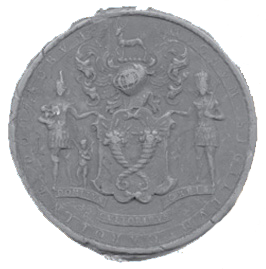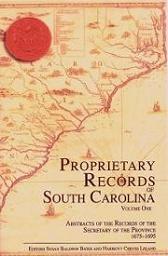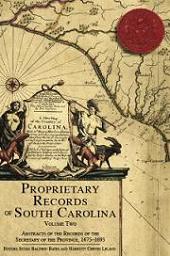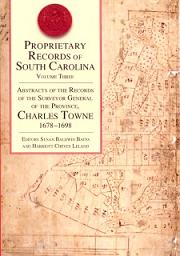Welcome to Carolina1670
COLONIAL RECORDS: South Carolina holds one of the finest collections of colonial records for the Proprietary Period (1670-1721). Preserved in the state archives, but only partially indexed and written in seventeenth century script, these official record books of the province are a challenge to use, particularly on microfilm, and have been underutilized by historians and researchers. Abstracting these volumes has become a project of historians and researchers Susan Bates and Cheves Leland, who have published three volumes of the Proprietary Records of South Carolina. The comprehensive introductions in these books explain the proprietary period of South Carolina’s history in which the colony was founded by eight noble men in England. Quoting from letters of the period, the editors tell of the harrowing voyage of the first colonists, a voyage of storms, shipwrecks and lost compatriots. They reveal the fear of Spanish and Indian attack and the struggle of the fledgling settlement to procure supplies to survive the first year. The growth of the colony, the building of towns and the roles the Secretary, the Register and the Surveyor General of the province of Carolina played in preserving the public records are discussed. Each volume provides early maps of South Carolina and illustrations of the original seventeenth century records, as well as footnotes and appendices giving extra details into the lives of the settlers found within the pages. The extensive indexes provide the access to the material on many levels to genealogists, historians and researchers and you are invited to search the indexes.
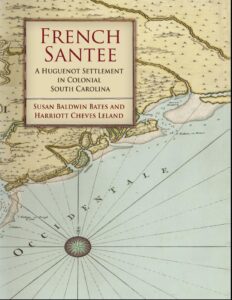 IT’S HERE! French Santee, A Huguenot Settlement in Colonial South Carolina has arrived from the publisher. For many years we’ve been promising you our book about the French and Swiss Protestants who settled on the Santee River in 1687. We are very happy to announce that after six years of researching and writing, the book is now available at local bookstores. It is an in-depth study of the Huguenot settlement on the Santee River in South Carolina with biographical sketches of the more than 100 families who lived there during the Proprietary Period. See our News and Notes page for details and information about ordering and book signings.
IT’S HERE! French Santee, A Huguenot Settlement in Colonial South Carolina has arrived from the publisher. For many years we’ve been promising you our book about the French and Swiss Protestants who settled on the Santee River in 1687. We are very happy to announce that after six years of researching and writing, the book is now available at local bookstores. It is an in-depth study of the Huguenot settlement on the Santee River in South Carolina with biographical sketches of the more than 100 families who lived there during the Proprietary Period. See our News and Notes page for details and information about ordering and book signings.
The authors are also looking for letters written to and from South Carolina during the proprietary period, 1670 to 1720s. Letters found to date provide fascinating details about life in the early colony and its settlers. The 1686 map and letter from Jean Boyd published in Transactions of the Huguenot Society of SC gave the first clue to the arrival of a group of French refugees who went on to settle French Santee. The letter also contains about 13 watercolor sketches of various plants and trees native to South Carolina. Researchers who know of correspondence from Charles Towne or Carolina which may date from this period are encouraged to contact the authors through this website.
Another area of interest for the authors is collecting data on ships which entered and left the port of Charles Towne or the Ashley River during the proprietary period, 1670 to 1720s. Since passenger lists for Carolina have not generally survived and merchant shipping logs usually begin at the end of this period, the authors are putting together a database of ships from references in letters, official records, shipping bills and in warrants for land – any documented sources available. Information about documented shippping activity in Charles Towne for this period is welcomed by the authors.
